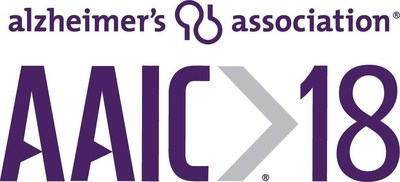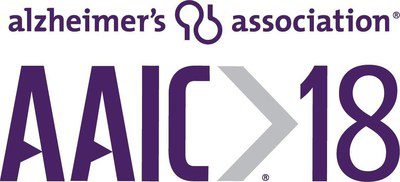 |
CONFERENCE ALSO RELEASES FIRST-EVER DEMENTIA DATA IN LGB SENIORS, AND WOMEN’S DEMENTIA RISK RELATED TO REPRODUCTIVE HISTORY
CHICAGO, July 25, 2018 /PRNewswire/ — The first randomized clinical trial to demonstrate that intensive blood pressure treatment reduces new cases of mild cognitive impairment (MCI), and the combined risk of MCI plus all-cause dementia, was the highlight of new research results reported at the Alzheimer’s Association International Conference (AAIC) 2018 in Chicago.
The preliminary results of the SPRINT MIND trial, presented at AAIC 2018, provide the strongest evidence to date about reducing risk of MCI and dementia through the treatment of high blood pressure, which is one of the leading causes of cardiovascular disease worldwide.
AAIC 2018 also featured additional data from a Phase 2 study of BAN2401 (Eisai, Biogen), which on July 5 had reported positive topline 18-month results suggesting a slowing of clinical decline and reduction of amyloid beta in the brain.
AAIC 2018 also featured several “firsts,” including the first-ever study evaluating dementia prevalence in a large population of lesbian, gay and bisexual (LGB) older adults, and the first large-scale study of reproductive history and dementia risk in women.
“The exciting data from innovative research studies reported at AAIC 2018 give us many reasons to be hopeful,” said Maria C. Carrillo, PhD, Alzheimer’s Association Chief Science Officer. “For example, the reduction in new cases of MCI seen in the SPRINT MIND study adds credibility to the vision of future Alzheimer’s therapy that combines drugs and modifiable risk factor interventions — as we do now in cardiovascular disease.”
“We welcome innovative clinical trial designs and therapeutic targets, and new methods of delivering therapies and attacking the disease, as we heard presented at AAIC,” Carrillo said. “A new therapy has not been approved in a long time. We need bold steps — from basic science all the way through clinical trials — to provide better treatments and prevention strategies for the millions of people living with Alzheimer’s and other dementias, and the millions more at risk.”
“The Alzheimer’s Association also strongly regards the results reported at AAIC from important patient populations, including women, LGB individuals, and centenarians. Understanding the impact of Alzheimer’s and other dementias on individuals living with the disease and caregivers from diverse backgrounds is crucial to better treating and preventing Alzheimer’s, and to appropriately supporting and caring for people living with it now,” Carrillo added.
AAIC is the premier annual forum for presentation and discussion of the latest Alzheimer’s and dementia research. Bringing the world closer to breakthroughs in dementia science, AAIC 2018 convened more than 5,100 leading experts and researchers from around the world and featured more than 2,500 scientific presentations.
New Alzheimer’s/Dementia Clinical Trial Results Offer Hope — SPRINT MIND Trial
At AAIC 2018, researchers reported preliminary results related to risk of dementia and cognitive decline from the Systolic Blood Pressure Intervention Trial (SPRINT). SPRINT is a randomized clinical trial that compares two strategies for managing high blood pressure (hypertension) in older adults: an intensive strategy with a systolic blood pressure goal of less than 120 mm Hg versus a standard care strategy targeting a systolic blood pressure goal of less than 140 mm Hg.
SPRINT Memory and Cognition IN Decreased Hypertension (SPRINT MIND) examined whether treating for the lower blood pressure target reduces the risk of developing dementia and/or MCI. Study participants were 9,361 hypertensive older adults with increased cardiovascular risk but without diagnosed diabetes, dementia or stroke. Participant mean age was 67.9 years (35.6 percent women) and 8,626 completed at least one follow-up cognitive assessment.
In SPRINT MIND, the researchers found a statistically significant 19 percent lower rate of new cases of MCI in the intensive blood pressure treatment group. The combined outcome of MCI plus probable all-cause dementia was 15 percent lower in the intensive versus standard treatment group.
“This study shows more conclusively than ever before that there are things you can do — especially regarding cardiovascular disease risk factors — to reduce your risk of MCI and dementia,” said Carrillo.
Link Between Pregnancy, Reproductive History and Dementia Risk in Women
Almost two-thirds of Americans with Alzheimer’s are women, according to the Alzheimer’s Association 2018 Alzheimer’s Disease Facts and Figures. The report also says that, of the 5.5 million people age 65 or older with Alzheimer’s in the United States, 3.4 million are women and 2.0 million are men.
Research reported at AAIC 2018 investigated women’s reproductive history across the entire life course and its relationship with risk of Alzheimer’s disease and other dementias, including the first-ever large-scale study (n=14,595) in this area. The researchers found that
- Women in the study with three or more children had a 12 percent lower risk of dementia compared to women with one child.
- Each additional report of a miscarriage was associated with a 9 percent increased risk of dementia, compared to women who reported no miscarriages.
- Women who indicated having their first menstrual period at age 16 or older were at 31 percent greater risk than those who reported having their first period at 13 or younger.
- Compared to women who experience natural menopause after age 45, those who experience natural menopause at 45 or younger were at 28 percent greater dementia risk.
A separate study presented at AAIC 2018 including 133 older women in the UK found that a woman’s total number of months of pregnancy, especially months spent in the first trimester, was a significant predictor of Alzheimer’s risk. The researchers reported that, in this study population, a woman who spent 12.5 percent more months pregnant than an otherwise identical woman had about 20 percent lower Alzheimer’s risk.
First Dementia Prevalence Data in LGB Older Adults
The first dementia prevalence data from a large population of lesbian, gay and bisexual older adults was reported at AAIC 2018 in Chicago. Researchers examined the prevalence of dementia among 3,718 LGB adults age 60+ who participated in the Kaiser Permanente Research Program on Genes, Environment, and Health (RPGEH).
Over 9 years of follow-up, the prevalence of dementia was 8 percent in this study population. For comparison, Alzheimer’s Association 2018 Alzheimer’s Disease Facts and Figures reports U.S. prevalence of Alzheimer’s disease dementia and other dementias for age 65+ at approximately 10 percent. According to the researchers, significant rates of depression, hypertension, stroke and cardiovascular disease in the study population may be contributing factors to the level of dementia.
- LGB seniors in the study with depression were 2.3 times more likely to develop dementia.
- Those in the study with heart disease were 69% more likely to develop dementia.
- Those in the study with hypertension were 56% more likely to develop dementia.
Current estimates suggest that more than 200,000 sexual minorities in the U.S. are living with dementia, but before this study almost nothing was known about the prevalence of dementia among people in these groups who do not have HIV/AIDS-related dementia. Future studies aimed at better understanding risk factors for Alzheimer’s and other dementias in the older LGB+ population are greatly needed.
The findings highlight the need for culturally competent health care and practice for older LGB+ individuals at risk for, or currently living with, Alzheimer’s disease or another dementia. Given the concerns of social isolation and sometimes limited access to friend and family caregivers, there is a strong need to create a supportive health care environment and caregiving resources.
Preliminary Successes and Ongoing Challenges Treating Non-Cognitive Symptoms of Dementia
While the memory and thinking symptoms associated with Alzheimer’s disease are the most well known, it is the behavioral and psychological symptoms of dementia — agitation, anxiety, apathy, depression, wandering, insomnia, incontinence, disinhibition — that often cause the greatest caregiving challenges and are the leading causes for placement in assisted living or a nursing home. Left untreated, these symptoms can accelerate decline and reduce quality of life.
At this time, the U.S. Food and Drug Administration has not approved any drug treatments for these symptoms in people with Alzheimer’s dementia. The Alzheimer’s Association recommends non-drug approaches as first-line alternatives to drug therapy for the treatment of dementia-related behaviors. These therapies include validation therapy, reminiscence and other personalized psychosocial interventions.
A randomized, double-blind clinical trial of nabilone — a synthetic cannabinoid — reported at AAIC 2018 suggests it may be effective in treating agitation in people with moderate to severe Alzheimer’s. Agitation, including verbal or physical outbursts, emotional distress, restlessness and pacing, is one of the most common behavioral changes associated with Alzheimer’s, and can be a significant cause of caregiver stress. Over the 14-week trial, 39 participants (77 percent male, average age 87) received nabilone in capsule form for six weeks, followed by six weeks of placebo, with one week between each treatment period. Agitation improved significantly in those taking nabilone, compared to placebo. More people in the study experienced sedation on nabilone (45 percent) compared to placebo (16 percent).
Note: Marijuana is not approved by the FDA for the treatment or management of Alzheimer’s disease or other dementias. There is currently no robust, consistent clinical trial data supporting the use of marijuana for treatment of Alzheimer’s dementia — nor for related issues. The Alzheimer’s Association believes that more research in this area is needed.
In two other studies reported at AAIC 2018:
- A small study of a customized lighting intervention, studied in 43 people in 10 nursing homes, found that study participants experienced significant decrease in sleep disturbance, depression and agitation.
- “Z-drugs,” such as zolpidem, zopiclone and zaleplon — often prescribed to help treat insomnia in older adults — when used by older adults with dementia, were associated with a 40 percent increased risk of fracture, with risk being greatest for those on higher doses. Z-drug use was also associated with a greater risk specifically of hip fracture and death. The data came from analyzing the UK Clinical Practice Research Datalink, and from three clinical studies of people with dementia.
Better alternatives are needed to the drugs currently being prescribed for sleep problems and other non-cognitive symptoms of dementia.
New Guidelines for Clinical Diagnosis of Alzheimer’s Disease and Other Dementias
Despite more than two decades of advances in diagnostic criteria and technology, symptoms of Alzheimer’s disease and other dementias too often go unrecognized or are misattributed, causing delays in appropriate diagnoses and care that are both harmful and costly. There currently are no consensus diagnostic recommendations for primary care physicians.
As reported at AAIC 2018, a workgroup convened by the Alzheimer’s Association has developed 20 recommendations for physicians and nurse practitioners, and is honing them with input from leaders in the field with the goal of publishing them later this year. The recommendations range from enhancing efforts to recognize symptoms to compassionately communicating with individuals and their caregivers. They include:
- All individuals who self-report or whose care partner or clinician report cognitive, behavioral or functional changes should undergo an evaluation.
- Concerns should not be dismissed as “normal aging” without a proper assessment.
- Evaluation should involve not only the patient and clinician but, almost always, also a care partner (e.g., family member or confidant).
The goal is to provide practical and specific U.S. guidelines that are relevant in both primary and specialty settings. The recommendations can then guide U.S. health care practitioners in the evaluation of individuals for memory, thinking, communication and personality changes, and symptoms of cognitive impairment, Alzheimer’s disease or another dementia.
How Gut Bacteria and Lipid Metabolism May Influence Alzheimer’s and Other Brain Diseases
In research reports over the last few years, we’ve learned how diet, particularly overall eating patterns, may be linked to brain health, cognitive decline and possibly even dementia as we age. We’ve also seen inflammation and its markers — in the brain and other parts of the body — associated with Alzheimer’s and other dementias. Emerging science has correlated certain changes in the gut bacteria with a variety of inflammatory and autoimmune conditions. And studies have shown that changes in diet can change the gut bacteria.
Four new studies reported at AAIC 2018 investigated how the digestive system, including gut and liver functions, may be related to changes in the brain, and to brain disorders such as Alzheimer’s disease and other dementias.
“While still in its infancy, gut microbiome research is very exciting since it may give us a new window into why diet and nutrition are so important for brain health,” said Carrillo. “This work may tell us more about how and why ‘good fats’ help keep the brain healthy, and help guide brain-healthy dietary choices.”
“In addition, if it turns out these gut bacteria are effective and accurate markers of Alzheimer’s disease, they might be useful as a non-invasive screening tool — a simple blood test,” Carrillo said. “However, we are only at step one. We don’t know yet exactly what the changes they are seeing mean — whether they are cause or effect.”
National Strategy for Recruitment and Participation in Alzheimer’s Disease Clinical Trials
At AAIC 2018, representatives of the National Institutes on Aging (NIA) at the National Institutes of Health (NIH), with facilitation by the Alzheimer’s Association, reported on progress of the National Strategy for Recruitment and Participation in Alzheimer’s Disease Clinical Research — an effort convened to outline practical, proactive approaches to help study sites and researchers recruit and retain volunteers for Alzheimer’s research studies. At the local level, two Alzheimer’s research recruitment programs working in African American communities reported successful efforts and methods at AAIC 2018, including registration in Alzheimer’s Association TrialMatch®.
The Alzheimer’s Association International Conference® (AAIC®)
The Alzheimer’s Association International Conference (AAIC) is the world’s largest gathering of researchers from around the world focused on Alzheimer’s and other dementias. As a part of the Alzheimer’s Association’s research program, AAIC serves as a catalyst for generating new knowledge about dementia and fostering a vital, collegial research community.
AAIC 2018 home page: alz.org/aaic
AAIC 2018 newsroom: alz.org/aaic/press
About the Alzheimer’s Association®
The Alzheimer’s Association is the leading voluntary health organization in Alzheimer’s care, support and research. Our mission is to eliminate Alzheimer’s disease through the advancement of research, to provide and enhance care and support for all affected, and to reduce the risk of dementia through the promotion of brain health. Our vision is a world without Alzheimer’s. Visit alz.org or call 800.272.3900.
Logo – https://mma.prnewswire.com/media/721324/AAIC_2018_Logo.jpg




Facebook Comments